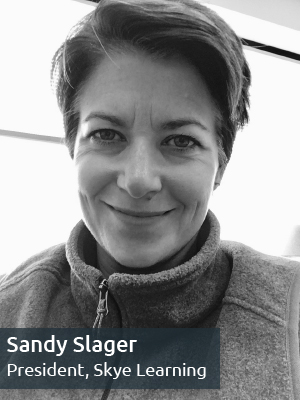
Can anyone be a good leader? Can leaders achieve work-life balance? What skills do leaders seek in job applicants?
We asked these questions to Sandy Slager, President of Skye Learning and Chief Operating Officer of MindEdge Learning. Learn more about Sandy and her thoughts on leadership, mentorship, and more in the Q&A section below:
1. Are some people better suited to leadership than others? Do you think leadership is innate or a learned skill?
I would characterize success in leadership as both an innate ability and a learned skill. In most cases, I believe that people evolve as leaders over time. I’m an introvert at my core; I get my energy by turning inward, as opposed to becoming energized by groups of people or other outside stimuli. Does that mean I don’t have the charisma to lead? Some would say “yes.” But over the course of my life, I’ve learned enough about myself and my leadership style that I’ve evolved into a leader at my company. It doesn’t come naturally to me—I wasn’t a born leader. But I believe that some people have qualities that make them natural born leaders; they attract followers. If you don’t exude charisma, you can still evolve into a highly successful leader who commands respect. It takes more work, but it happens every day.
2. Who were important mentors or role models in your life, and how did they influence your career?
I have been lucky to have very strong women in my family—my grandmothers, my mom, and now my wife—who have taught me how to be tough, how to be loving, and how to work hard. And all of that feeds into my success in business. But beyond that very strong foundation, I learn every day from all levels of staff at my company. Jeff Flanders is the CEO of MindEdge, and he has offered me an on-the-job business education for over a decade. But there’s no reason to believe that our mentors and role models need to have more experience than we do. My younger staff bring an entirely new energy and perspective to some business challenges. I find that this offers a winning combination of mentorship and learning that keeps me well-rounded and evolving over time as a business manager and leader.
3. What do you find most rewarding about your job?
The most rewarding part of my job is having opportunities to mentor and manage younger staff. As a parent, I draw many parallels between the skills required to parent and the skills required to manage younger workers. As an example, knowing when to intervene in a conflict requires instincts. These instincts, whether in parenting or in business, require almost the same thought processes and self-restraint. It’s this part of my job that makes being at work feel a little more like home. It also makes being at home feel like I’m actually getting better at my work.
4. How do you pursue work-life balance, and what does “work-life balance” mean to you?
First of all, most instances of someone struggling with work-life balance means that they are dedicating more time to work than to life, not the other way around. So, to me, work-life balance means that I am with my children, uninterrupted, both over breakfast and over dinner. There are always exceptions, in both directions, and I’m often cleaning up work items after the kids go to bed. But by defining what day-to-day work-life balance means to me in real terms, I can plan my day with that goal in mind. I can take stock of my week in advance to make sure that “life” items are being addressed—time for exercise, time for cooking, time for sleep—while ensuring that I’m meeting work deadlines and obligations.
5. Are there universal skills or qualifications you look for in job applicants? What makes a resumé, cover letter, or job interview stand out?
Regardless of the job I’m interviewing for, I will always favor a resumé that is clear, well-written, and free of typos. Effective communication is so important in business. Whether you’re an entry-level assistant, a software engineer, or a senior manager, I begin assessing your communication skills from the moment you submit your resumé or application. If at any time during the scheduling of a phone call or an in-person interview I begin to question your professionalism or clarity, the odds of earning the job offer decrease significantly. My advice for anyone applying for a new job—any new job—is to put your best foot forward. Be clear. Be professional. Dress well. And follow up. Hiring managers are more likely to give you slack on a skillset you’re lacking if they believe in you and your potential as a professional and team member.
6. What would most people be surprised to know about you?
I’m a relatively open book, and I don’t have any secret talents that are particularly eyebrow-raising. So, I’ll say… these are the things people might be surprised to know that I can’t do or dislike, embarrassing and all. I can’t whistle, not even a little. I have flying anxiety, so any air travel is exhausting to me. Whenever I try to use “thermostat” or “thermometer” in a sentence, I say the wrong one. I used to have three cats, and my wife still tells people that I was a crazy cat lady until she rescued me. I make homemade dog bones, but that’s about where my baking skills end. I struggle to relax sitting on a couch watching TV, so I often watch TV standing up. If I’m flipping through channels and We’re the Millers is on, I’ll stop and watch it every time. I’d rather do my taxes or visit the dentist than do laundry. I prefer sitting in the shade to sunbathing. And, though it depends on the circumstances and the audience, I don’t embarrass very easily.






